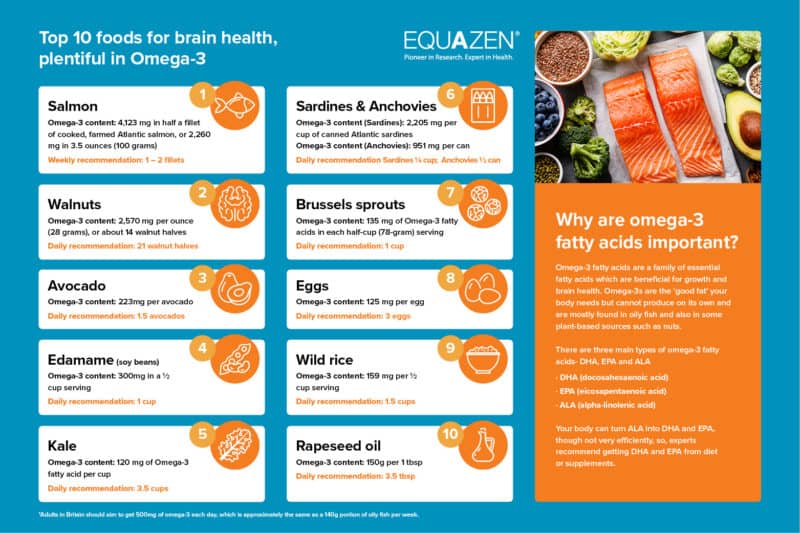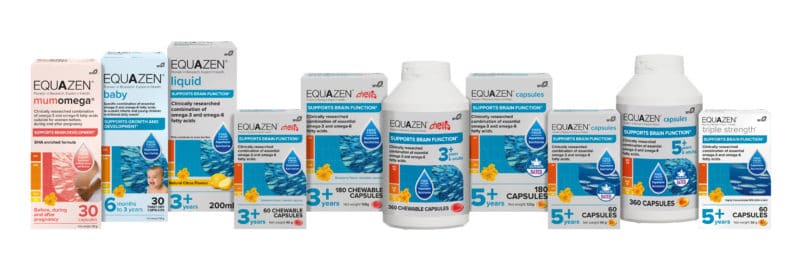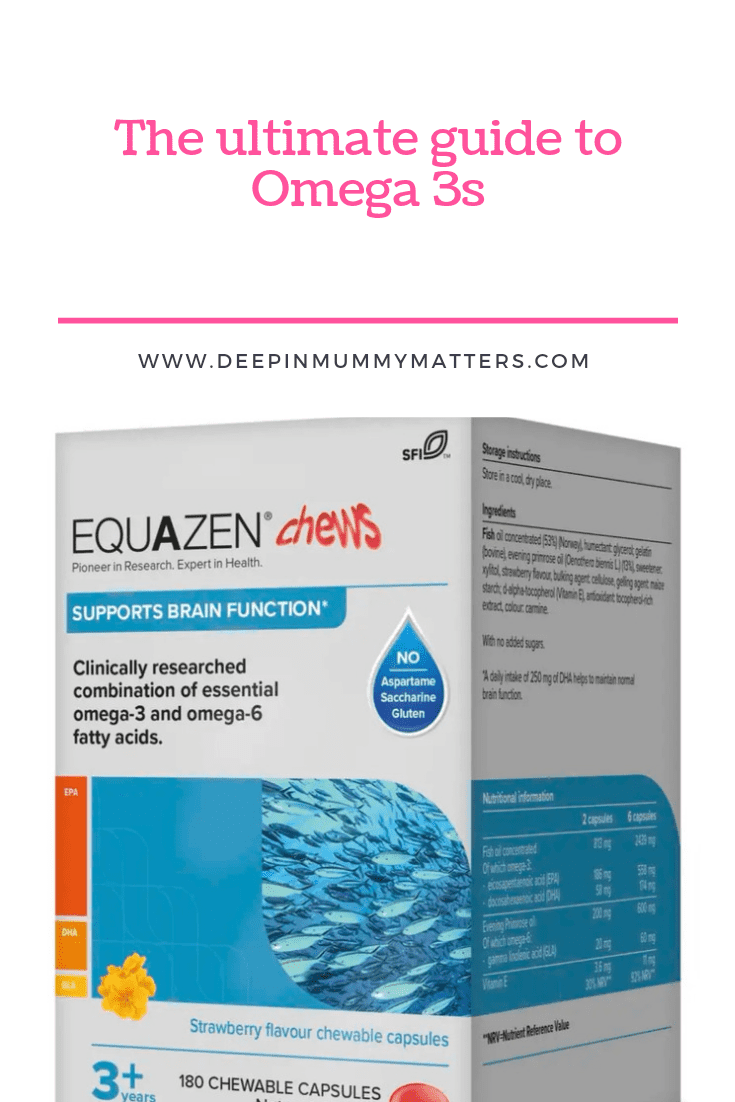Omega-3s are a type of fat that is essential to our brain health. They provide a number of benefits including reduced risk of depression, improved cognitive function, and decreased risk of dementia.

Omega-3s are essential to human health because they play an important role in the development and functioning of our brains. The benefits of omega-3s include reduced risk for depression, improved cognitive function, and decreased risk for dementia.
- Omega-3s are especially beneficial for kids’ brain health. Many clinical studies even suggest that omega-3s may also aid sleep quality and reduce symptoms of ADHD.
- Salmon, mackerel, and sardines have some of the highest levels of omega-3s
- The Pacific Island nations, the Mediterranean basin, Iceland, South Korea and Japan have the highest omega-3 consumption
Equazen®, omega-3 fatty acid specialists, have looked at the findings from a recent Statista report, which says people in the UK are not getting the number of fatty fish acids we need. According to the report, an average of just 146 grams of fish was purchased per person per week for household consumption. Meaning that even a 100g portion of Mackerel per week isn’t enough to meet government guidelines.
What is the Importance of Omega-3s in Our Diet and How Can They Help with Brain & Mental Health?
Omega-3s are essential fatty acids that are important for our brain and mental health. They have been shown to help with issues such as depression, bipolar disorder, and schizophrenia.
Omega-3s are essential fatty acids that play a crucial role in the development of the brain and nervous system. Omega-3s help to regulate mood, behaviour, and cognitive functions like memory. They also play an important role in how we process information from both our environment and ourselves.
A diet high in omega-3s has been shown to reduce the risk of heart disease, stroke, cancer, arthritis, asthma and autoimmune diseases like Crohn’s disease or psoriasis.
Roz Kadir, Clinical Nutritionist, and adviser to Equazen® said:
“Be a good label reader and look out for foods that are fortified although the doses will be lower than that found in fish.
“Oily fish is always top of the list for choices of the highest amount of omega-3 but to provide some variety in your diet, don’t ignore the following list of foods even if the oil in them isn’t as easily digested as that from fish sources.
“An alternative for those struggling to get the recommended intake would be to consume fish oil supplements such as Equazen®. The formulation of omega-3 and 6 is clinically proven, with a good balance for those who want to integrate their diet with these beneficial nutrients.”
Omega-3 Benefits for Mental Health
Omega-3s are a type of polyunsaturated fatty acid that is essential for healthy brain function.
Omega-3s have been shown to help with anxiety and depression, as well as other mental health disorders. Omega-3s can also help with mood disorders like bipolar disorder and schizophrenia.
Omega-3s are important for the development of a healthy brain and nervous system, including the formation of the cerebral cortex, which is responsible for memory, language, and sensory processing.
How to Get Enough Omega-3s in Your Diet

Omega-3 fatty acids are important for maintaining a healthy brain, heart, and skin. You can get enough omega-3s in your diet by eating foods that have omega 3s or taking a supplement such as Equazen.
How much Omega-3 should we eat?
According to the British Dietetic Association (BDA), you should try to eat two portions of fish per week, one of which should be oily, to get the most benefit. The BDA has also recommended portion sizes for adults and children to help get the right amount of omega-3 in your diet.
| Age | Portion Size |
| 18 months to three years | ¼ – ¾ small fillet or 1 to 3 tablespoons of omega- 3 rich oils (ie: rapeseed oil) |
| 4-6 years | ½ – 1 small fillet or 2 to 4 tablespoons |
| 7-11 years | 1 – 1 ½ small fillets or 4 to 6 tablespoons |
| 12 years to adult | 140g (5 oz) of fresh fish or 1 small can of oily fish |
Sharing Kate Moryoussef’s extensive personal experience
Kate Moryoussef, a busy mum of 4, is a lifestyle and well-being coach, guiding women (many with ADHD) to understand the importance of prioritising their own wellbeing and lifestyle in order for them to feel more self-compassionate, healthier, more productive, more aligned and resilient to deal with their careers, relationships and/or families. Kate also hosts a podcast called ‘The ADHD Women’s Wellbeing Podcast’.
At the age of 40, Kate was diagnosed with ADHD and has successfully navigated her way through maintaining a healthy lifestyle through exercise, diet, and taking supplements.
Kate says,
“As a busy mum of four kids aged between seven and sixteen, I’m always trying to get the right nutrients into them for their brain health and emotional regulation. It can often feel all-consuming ensuring that they’re eating well and exercising as well as setting healthy social media boundaries. Definitely challenging times for parents!
Here are some of my tips to help both yourself feel calmer, as well as getting your children to be open about trying a new food for optimum brain health.”
- Remember that balance is key. If they have had a healthy meal in the day at some point, can you release the pressure off yourself and accept that not every meal has to be highly nutritious?
- If your child is a fussy eater, keep trying new combinations. If they don’t eat brain-healthy roasted sweet potatoes, try them mashed with some honey and cinnamon. If they won’t eat steamed broccoli, maybe try broccoli fritters with feta. Time-consuming – yes but also rewarding knowing they’re eating nutritious food.
- My go-to fish for my kids is always salmon. It ticks all the boxes for omega 3s, which can be found in most oily fish. I cook it in different ways to keep the variety. However, if they won’t eat fish, I’m relieved to say that Equazen® offers the same fatty acids, such as Omega 3s and 6s, which all kids need for mood, focus and sleep.
- Keep healthy snacks accessible. I keep a glass jar of mixed nuts and seeds (which are great snacks for brains) such as walnuts, brazil nuts and almonds. Try keeping an accessible selection on the kitchen counter which means if they’re really starving, they tend to grab a handful!
- I truly believe most kids don’t drink enough water, which is key for mood regulation, concentration, behaviour and sleep. If you think this may be a reason your child may be suffering from poor focus or behaviour try new things such as keeping ice in the freezer, flavouring it with fruit or low sugar cordial.
- To be sure that you and your children are getting enough essential fatty acids, I’d highly recommend Equazen® supplements for all the family.
WIN Equazen Supplements Bundle worth £100

We are delighted to be working with Equazen to offer one lucky reader a bundle of Equazen Omega-3 supplements, worth £100.
Equazen Omega-3 Supplements Bundle worth £100

i am a huge fan of supplements that give you a natural protection, Omega 3 is such a great supplement and something that is important in our diets
Me too, especially as I don’t eat a full balanced diet x
I need supplements and hope that i win some because i cant afford them myself
Wishing you lots of luck.